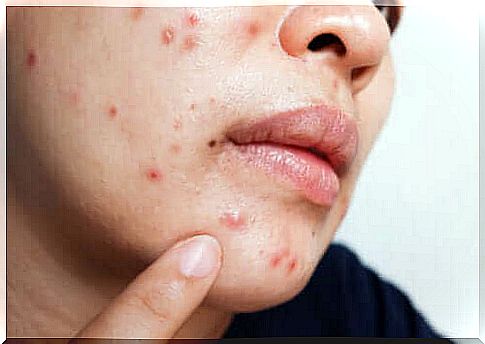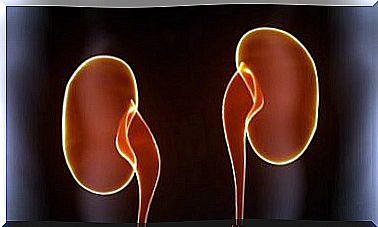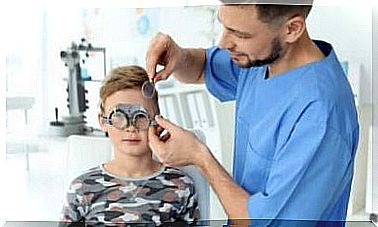Benefits And Side Effects Of Using Isotretinoin For Acne

Today we will tell you more about the various benefits and side effects of using isotretinoin.
Isotretinoin is a drug that is useful in treating moderate to severe acne. It is available in capsules of 10, 20 or 40 milligrams, and is estimated to be effective in up to 80% of cases.
The average treatment lasts 4-5 months. Doctors also sometimes prescribe isotretinoin to treat other skin problems or even some types of cancer.
Despite its effectiveness , it can cause significant side effects. For example, it causes birth defects, so pregnant women should not use it. At the same time, one should never use it concurrently with vitamin A supplementation.
Let’s take a closer look at it.
What is isotretinoin for?
Although isotretinoin is useful for treating different types of acne, doctors almost always prescribe it to treat a severe type called severe, stubborn, nodular acne. Doctors usually recommend it only when other approaches have not worked.
It is one of the most effective medications for acne. In some cases, doctors also prescribe it to treat problems such as rosacea, hydrosadenitis suppurativa, folliculitis decalvans, chronic hand dermatitis, premature skin aging and psoriasis. At the same time, professionals have been recommending it to treat some types of skin cancer since the 1980s.
What are the benefits to the body of using isotretinoin for acne?
Isotretinoin is a drug that works on several levels. It has a comedolytic effect, which means that it prevents the formation of the blockages that give rise to comedones or blackheads. This causes a highly significant improvement in the lesions already present and it prevents the occurrence of new ones.
This medicine inhibits the rapid multiplication of bacteria called Propionibacterium acnes. These microorganisms are found naturally on the skin, but their spread causes various infections – including acne.
Isotretinoin also has anti-inflammatory properties. One of the primary benefits is that it reduces the production of sebum. This makes it very effective in treating several skin problems.
Side effects of taking isotretinoin
The side effects of isotretinoin can be mild or severe. Among the former is an increased dryness that affects the skin, lips, nose and eyes. This leads to problems such as chapped lips, nosebleeds and dry eyes.
These side effects almost always go away on their own. When they do not, it is important to consult a doctor. At the same time, this medication can also cause more severe reactions, which we will look at below.
High cholesterol
This drug can increase the concentration of cholesterol. It is more common in people who are overweight, have diabetes, metabolic syndrome or consume alcohol. It is best to follow up with regular blood tests.
Isotretinoin can cause muscle and joint problems when you want to fight acne
Patients have reported muscle and joint pain when taking isotretinoin. In teens, it can stop the natural growth of the long bones. It can also cause muscle weakness.
Pressure on the brain
Pressure on the brain is not a common effect, but it is very serious. It can lead to vision loss and even death. It manifests itself through symptoms such as severe headache, dizziness, nausea, vomiting and blurred vision. This condition should be treated as soon as possible.
Skin rash
Occasionally, skin rashes can occur, which can be serious, although this is unusual. It is considered a medical emergency and may be accompanied by the following symptoms:
- Blisters on the arms, legs and face.
- Sores in the eyes, nose, mouth or throat.
- Peeling of the skin.
Organ damage and toxicity
Isotretinoin can damage organs such as the liver, pancreas, intestines and esophagus. However, it is rare. Symptoms such as intestinal bleeding, yellowing of the skin, dark urine or very severe abdominal pain are warning signs.
Hearing problems
It is possible, although uncommon, that this medication causes hearing loss or ringing in the ears. If it occurs, it is important to see a doctor immediately.
Isotretinoin to treat acne can cause vision problems
The medicine can cause dry eyes, but also an unusual amount of tears in the eyes. It also sometimes causes blurred vision, double vision or tunnel vision. It can also be harder to see in the dark.
Allergic reactions
This medicine causes moderate to severe allergic reactions. Sometimes there are rashes, bruises on the legs or red spots. If there is a rash, swelling of the face or breathing problems, you should seek medical attention immediately.
Diabetes
This side effect of isotretinoin is also uncommon. In some people, it can lead to blood sugar problems that can lead to diabetes. It is very important to be aware of the symptoms and discuss any doubts with your doctor.
Low concentration of red blood cells
This medication can reduce the concentration of red blood cells in the blood and cause diseases such as anemia. The primary symptoms are weakness, fatigue, dizziness, pale skin and cold hands and feet.
Low white blood cell concentration using isotretinoin to treat acne
A low concentration of white blood cells increases the risk of infections. If a person takes this medicine and more often gets fever or infections, then he should tell his doctor. In any case, it is not common.
Mental problems
Isotretinoin can cause serious mental health problems. It can lead to depression, suicidal thoughts and even psychosis or loss of contact with reality. If there are noticeable changes in mood or behavior, one should consult his doctor.
Considerations before using isotretinoin to treat acne
All people should be informed in detail about the possible side effects of isotretinoin. In some cases, one may have to sign an informed consent. Patients should tell their doctor about any other medicine, supplement, or substance they take regularly.
Several of the most serious effects of isotretinoin are related to pregnancy. A woman who is pregnant or breastfeeding should not take this medicine. Women should also not take it if they are planning to get pregnant. Abortion, premature birth and malformations in the fetus can be a result of using it.
If a woman is taking this medicine, she should make sure to use a reliable method of contraception. In the case of men, this substance may be in their sperm, and experts do not yet know if it has any effect if it fertilizes a woman. Therefore, caution should be exercised accordingly.
Isotretinoin is a drug that should be used with caution against acne
It should be noted that some of the adverse effects caused by isotretinoin are reversible, but this is not the case with others. Sometimes patients just have to stop taking the medication, while in other cases the damage is permanent.
Such a substance should be taken with the utmost care. The indications must be followed with precision, the prescribed tests must be performed and the doctor must be informed of any change or concern.









